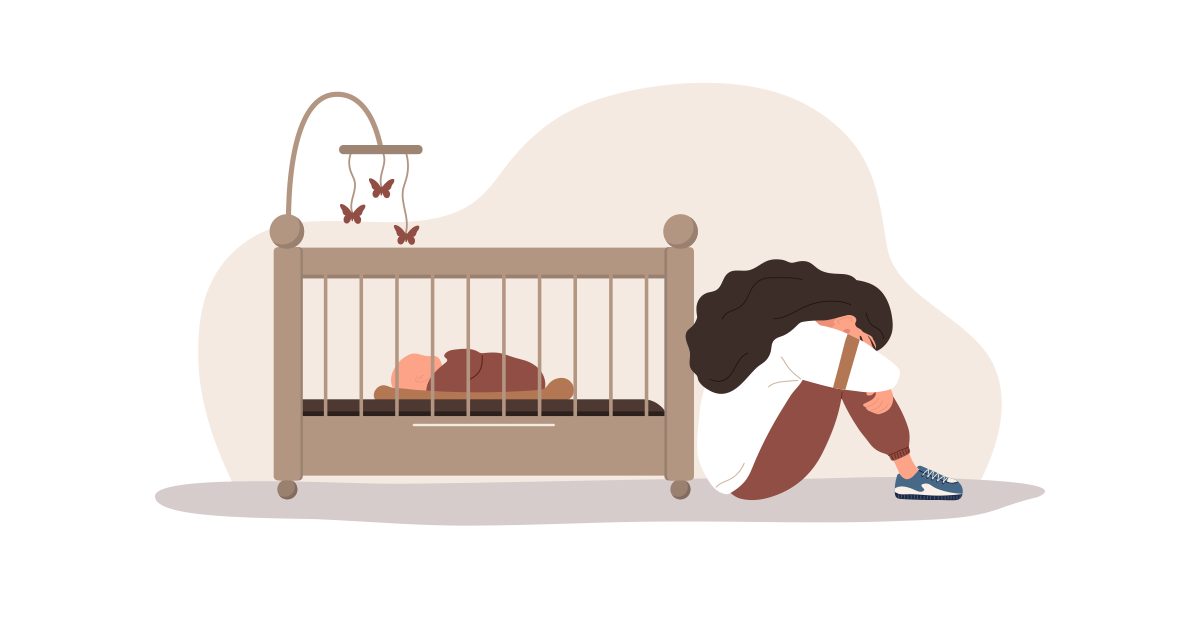Depression during pregnancy is more common than you might think. In fact, the CDC’s research shows that around 1 in 8 pregnant women will experience some form of depression.
However, there’s a lot of confusion about the difference between perinatal and postpartum depression. In this blog post, we’ll clear up the distinctions between these two types of depression and provide information on how they can be treated.
What Is Perinatal Depression?
Perinatal depression is defined as a depressive episode with an onset during pregnancy or in the first four weeks postpartum (after the baby is born). This type of depression can affect any woman, regardless of her history of mental illness.
Perinatal depression can be caused by several factors, including hormonal changes, sleep deprivation, and stress. It’s important to remember that perinatal depression is an actual medical condition that requires treatment.
What Are the Symptoms of Perinatal Depression?
The symptoms of perinatal depression can make everyday tasks seem impossible. Many get in the way of daily life and make simple tasks like getting up in the morning or cooking challenging chores.
Some common symptoms include:
- Feelings of sadness without reason
- Loss of interest in activities that were once enjoyed
- Withdrawal from friends and family
- Changes in appetite
- Difficulty sleeping
- Fatigue
- Anxiety
- Intense irritability
- Frequent Crying
- Feelings of guilt
All of these symptoms can come on at any time during pregnancy or in the first four weeks postpartum.
How Do You Treat Perinatal Depression?
If you think that you might be suffering from perinatal depression, it’s important to seek help from a mental health professional or your doctor. There are many different treatment options available, including medication and therapy.
Using medication to treat perinatal depression is something you want to discuss with your doctor or healthcare professional before making a decision, as recommendations may change depending on the status of the pregnancy or your health post-birth.
You can create a plan with your healthcare provider to help move past perinatal depression.
What Is Postpartum Depression?
Postpartum depression is a form of clinical depression that can occur after the birth of a child.
While most women experience some level of “baby blues” in the weeks following childbirth, postpartum depression is more severe and long-lasting. Just like perinatal, postpartum depression can be caused by a number of factors.
What Are the Symptoms of Postpartum Depression?
Many of the symptoms of postpartum depression are similar to perinatal, while some can become more severe depending on the woman’s history of depression in the past. Many of the symptoms are directly tied to being a mother.
The symptoms include:
- Feelings of sadness with no known cause
- Unwillingness to take care of your baby
- Trouble feeling close to your baby or wanting to bond with them
- Intense irritability and anger
- Withdrawing from friends and family
- Changes in appetite or eating too much or too little
- Sleeping too much or having difficulty sleeping
- Having no energy or motivation to do anything
- Anxiety
- Feelings of hopelessness, worthlessness, and helplessness
These symptoms can appear anytime during the first year of your child’s birth but are most common within the first 1-2 months of bringing your baby home.
How Do You Treat Postpartum Depression?
After giving birth, your health care provider may recommend that you book an early checkup for postpartum depression. This can provide early warning signs and give you a better treatment plan to help deal with it.
Remember that postpartum can be triggered by previous depression from your past, so it’s essential you get ahead of the symptoms getting worse.
Differences Between Postpartum and Perinatal Depression
While both perinatal and postpartum depression can be similar, there are a few key differences to be aware of.
Perinatal is a type of depression that can happen during pregnancy or the first four weeks postpartum.
Postpartum depression is more severe and long-lasting than perinatal depression. It has many different causes, including hormone changes after the baby is born and stress from problems that usually occur to a new mom, such as lack of sleep, trouble breastfeeding, and even money issues after incurring new baby costs. Postpartum depression can also affect both women and men dealing with the stress of being new parents.
Treatment for both types of depressions are similar, but with postpartum, you will want to get help and create a plan as soon as possible.
If you or someone you know is dealing with perinatal or postpartum depression, many resources are available to help. Here are just a few:
The National Perinatal Association
NPA offers support groups and information for pregnant women and new mothers suffering from perinatal depression.
With support for women suffering from postpartum depression, Postpartum Progress provides information through their website, blog, and online community.
Your Local Community
Many resources for new moms can easily be found through your local city or town resources. Online support groups specifically for mothers suffering from postpartum depression can easily be found through your local community website or using a search engine.
Ketamine Can Treat Both Perinatal and Postpartum Depression
In recent years, ketamine has been replacing many medications for perinatal and postpartum depression, which can take several weeks to months to work. People who need treatment for depression due to its severity have been turning to ketamine treatments.
Although not many studies have been done on the effectiveness of reducing both types of depression using ketamine, many mothers have had positive personal results, and Restoring Wellness Solutions continues to be a trailblazer in ketamine treatments for depression.
If you’re looking for a quick and effective way to treat perinatal or postpartum depression, Restoring Wellness Solutions can help with ketamine.
Ketamine is a medication that’s been used for years to treat pain, but it’s also shown promise in treating depression. You can learn more about our depression treatment options here.
No matter what type of depression, speak with your provider to see if the treatments at Restoring Wellness Solutions are right for you. We are here to listen, help you plan, and create the right program for you.






